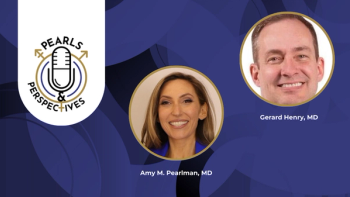
Thairo Pereira, MD, on IU’s andrology fellowship, research on ‘couplepause’
"We hypothesize that when we treat female sexual dysfunction, we can ultimately improve the dynamics between the couple, and therefore improve the male partner satisfaction with his IPP," says Thairo Pereira, MD.
In this interview, Thairo Pereira, MD, shares his experience in Indiana University’s Andrology Fellowship Program and highlights ongoing research on ‘couplepause’. Pereira is the outgoing andrology fellow at the University of Indiana in Indianapolis.
Video Transcript:
I'm Thairo Pereira. I'm the outgoing fellow here at IU, the andrology fellow with Dr Helen Bernie, and I would like to share my experience that I’ve had here during this year. It is really an amazing program. You have wonderful 1 on 1 mentorship with Dr Bernie. She's a wonderful person. She's an amazing surgeon. Here you have the chance to experience a high-volume surgical center, and also you have plenty of opportunity to deal with clinical management for patients with low testosterone, erectile dysfunction, and for infertility cases for [the] male population as well, and also several office-based procedures. Besides that, you have plenty of opportunities to attend the main conferences throughout the country and some international conference as well. Besides, you also have the opportunity to attend the prestigious microsurgery course at Cornell University [with] Dr. Philip Li, which is amazing for enhancing your microsurgical abilities. And besides that, you have great opportunities to network with other peers [and] world class faculty at the SMSNA Bootcamp that happens every year in Minneapolis. You have the chance to have a lot of fun with them as well, which is important. You can share experience with your industry partners. So, it's a wonderful opportunity that this fellowship offers as well.
[From] the research standpoint, we have a lot of opportunities. This year, we have a research project [where] we applied for 2 grants, and we got both of them. One was offered by SMSNA, and the other one was provided by an industry partner. That's a very interesting and innovative project; basically during middle age, there is a share of needs for diagnosis and management between couples. There is a technical term called couplepause. It's a period [where] both women and men have some hormonal changes that are expected to happen with age. Unfortunately, many people believe that this is normal, but this is not normal, and we can treat it both for male and female dysfunction. With this project, it is the first one that we aim to screen for female sexual dysfunction from partners that their male partners are having an IPP placed. Our project aims to screen those female partners, and for those ones that are symptomatic for genitourinary syndrome of menopause, we want to treat them. We hypothesize that when we treat female sexual dysfunction, we can ultimately improve the dynamics between the couple, and therefore improve the male partner satisfaction with his IPP. So, I'm very excited. I'm not the only one involved with this. We are going to share all this research with our amazing female specialist, Dr. Ramzy Burns, and with Dr Bernie as well. I'm pretty sure that so we're going to be back at the Urology Times to share our results with you all. Thank you very much.
This transcription has been edited for clarity.
Newsletter
Stay current with the latest urology news and practice-changing insights — sign up now for the essential updates every urologist needs.






